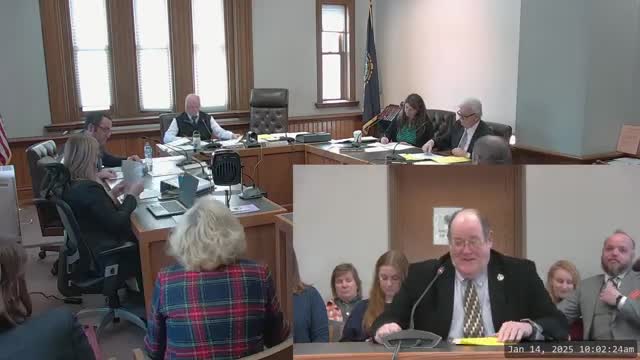Senate committee opens discussion on political signs in rights-of-way; municipalities and civil-rights groups raise legal and practical concerns
Get AI-powered insights, summaries, and transcripts
Subscribe
Summary
SB 45 would clarify placement of political advertising in state rights-of-way, including a proposal to limit placement to within 10 feet of property lines; witnesses and municipal representatives flagged ambiguous language, constitutional concerns, and implementation questions.
Senator James Gray, presenting a bill described in committee as aimed at clarifying where political advertising may be placed in state rights-of-way, said the intent is to reduce the number of campaign signs illegally placed in road rights-of-way and to resolve confusion about property ownership and sign placement.
"This bill, if nothing else, is meant to have a conversation and let us come online and say, well, what are we going to do or what are we not gonna do about the signs?" Senator James Gray said.
Testimony highlighted multiple issues. Margaret Burns, executive director of the New Hampshire Municipal Association, said the statute needs clarification and that municipalities should retain authority to regulate signage on municipal property. "It is not the most crystal clear state statute that I have ever read," Burns said, and she asked to work with the sponsor on workable language.
The ACLU of New Hampshire's deputy legal director, Henry Clementowich, opposed the bill and raised First Amendment concerns about treating political advertising differently from other signs. Clementowich urged the committee to consider that the underlying property fee often remains with homeowners even where a public right-of-way exists and said regulating signs in those areas may implicate home-based free-speech protections.
Several commenters and committee members debated Section 4(c), which in the draft reads as a 10-foot proximity rule tied to property lines; witnesses said the language was unclear whether signs must be within 10 feet of a private property line or no farther than 10 feet from the back edge of the state right-of-way. Ken Barnes said the text as drafted seemed to require that signs be placed "not more than 10 feet from the property line," whereas the sponsor had described an intent to keep signs further from the road.
Municipal officials also raised practical enforcement questions: smaller towns without staff or surveys could face uncertainty over where signs are permitted, and the New Hampshire Municipal Association warned that treating political signs differently from commercial or issue signs risks constitutional challenge.
Why it matters: SB 45 would affect where political signs may legally be placed along roads statewide and could change enforcement by municipalities and the state. The transcript records substantive legal and constitutional concerns that the committee will need to reconcile if the bill advances.
Next steps: The sponsor and municipal association expressed willingness to refine language; no committee vote was recorded in the transcript.
